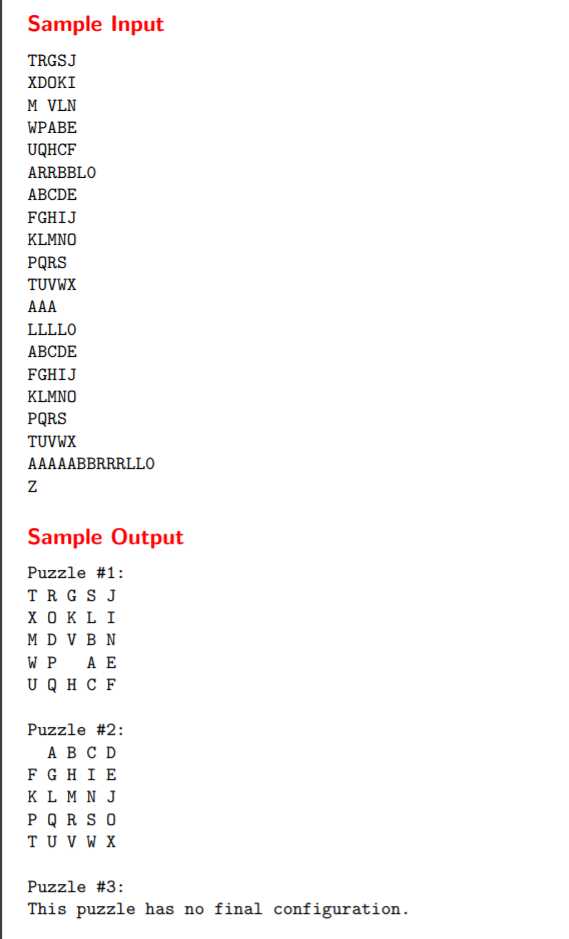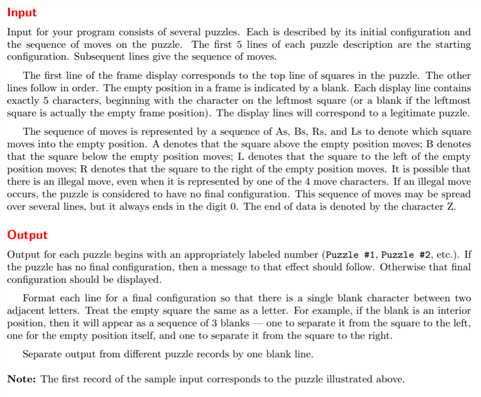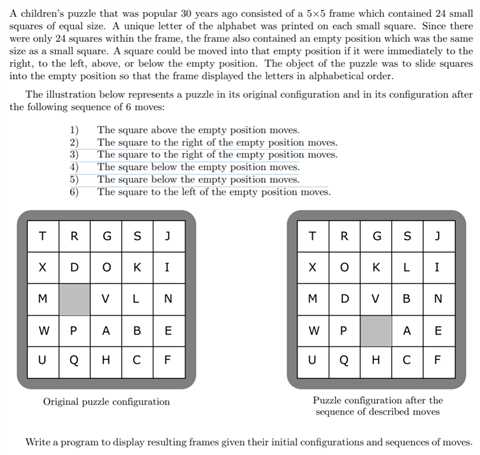Puzzle UVa227(分析和问题解决)
Posted dreamworldclark
tags:
篇首语:本文由小常识网(cha138.com)小编为大家整理,主要介绍了Puzzle UVa227(分析和问题解决)相关的知识,希望对你有一定的参考价值。
一想到这个题目AC的情景啊,那个激动兴奋的,交了几十遍。。。。各种错误,真的是说不出来的感觉。但是收获也不少。在此分享。
- 从技术上来说,调用指针和使用函数封装功能能加快代码的运行速度和简化代码。
- 出现Runtime Error的时候首先最最最重要的是检查一个地方。第一,所有带循环的地方,一定要看有没有死循环的。第二,数组有没有越界,特别是使用指针的时候,这种情况很容易发生,但是非常难查出来。所以提前就要把范围看好了,并检查,这样会省很多时间走弯路,因为你很难想到哪个指针指偏了(就像这里的代码,我最早的时候写的是+25,怎么检查都想不明白哪儿有问题,等最后才想到这个,都已经浪费了一下午了。)
- 对于格式,一定要与题目一致,就比如这题竟然最后一个输出后面不能有空行(心塞)。还有有点地方需要使用getchar()吃掉回车,防止被放在Puzzle里面那就。。。。
- 对于检查,我们可以重载printf(),使他可以对文件流进行操作,极大的方便看我们的输出。当然输入也方便许多。
- 要是实在想不明白,解决不了的地方,一个可以逛逛别的人的提问和源码,一个也可以选择走一走散散心,回来再想,这样也不至于困苦到砸键盘是吧。
- 努力总是有回报的。



code:
#include<stdio.h> #include<string.h> //#define LOCAL char puzzle[35]; // the function to change position. // A is the movement. // B is the array of Puzzle. int chposition(char a, char b[]) { char c(‘0‘); char* temp = strchr(b, ‘ ‘); // return 1 when occurs the wrong move or out of the range. if( a == ‘A‘) { if(temp-5 < b) return 1; c = *(temp-5); *(temp-5) = *temp; *temp = c; temp = temp - 5;} else if( a == ‘B‘) { if(temp+5 > b+24) return 1; c = *(temp+5); *(temp+5) = *temp; *temp = c; temp = temp + 5; } else if( a == ‘L‘) { if((temp-b)%5-1 < 0) return 1; c = *(temp-1); *(temp-1) = *temp; *temp = c; temp = temp - 1; } else if( a == ‘R‘) { if((temp-b)%5+1 > 4 ) return 1; c = *(temp+1); *(temp+1) = *temp; *temp = c; temp = temp + 1;} else return 1; return 0; } int main() { //overload the printf and scanf. #ifdef LOCAL freopen("data.in", "r", stdin); freopen("data.out", "w", stdout); #endif int count = 0; int first = 1; while(true) { memset(puzzle,0,35); count++; char c = getchar(); //if ( c == ‘ ‘) c = getchar(); //ignore the ‘ ‘ if( c == ‘Z‘) break; //‘Z‘ the signal of the end. else puzzle[0] = c; int i = 1; for(; i < 25; i++) { puzzle[i] = getchar(); if(puzzle[i] == ‘ ‘) i--; } int flag = 0; int taq(0); while( (c = getchar()) && c != ‘0‘) { if(c == ‘ ‘)continue; flag = chposition(c, puzzle); if(flag == 1) taq = 1; } getchar(); if( first == 1) { first = 0; } else{ putchar(‘ ‘); } printf("Puzzle #%d: ",count); if(taq) printf("This puzzle has no final configuration. "); else { for(i = 0; i <25; i++) { if((i+1)%5 == 0)printf("%c ", puzzle[i]); else { printf("%c ", puzzle[i]); } } } } return 0; }
以上是关于Puzzle UVa227(分析和问题解决)的主要内容,如果未能解决你的问题,请参考以下文章